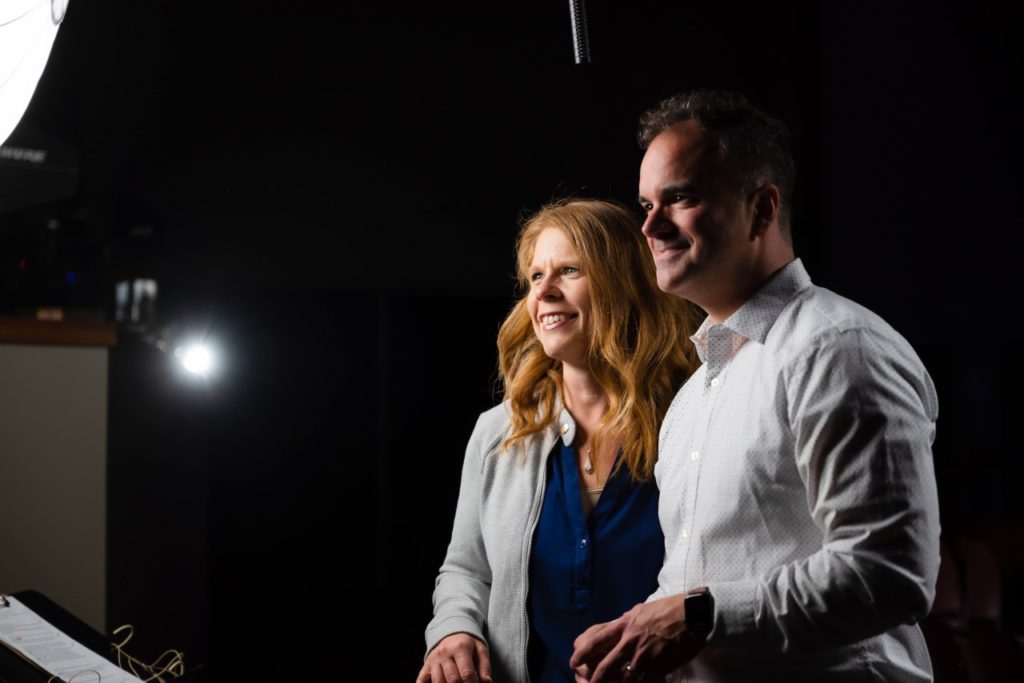Playing to One Another’s Strengths
Playing to One Another’s Strengths
Categories: AACC BLOG
by Ashley Elliott, MS, LMHCA, and Chuck Elliott, MOL, MAE

Consider your partner’s strengths. Do their qualities always fill your heart with joy? Or do their wonderfully crafted attributes occasionally annoy you?
Some of you are much more spiritual than we are and may love the depth that your spouse contributes to your relationship, but we’re going to focus on what happens when we get irritated by our partner’s differences. Maybe those of you super spiritual readers can gain some empathy for us lower-level Christians.
Why might we feel frustrated with our partner’s strengths? Isn’t it because we feel inferior in some way? But we can work to reframe how we think about our spouse. Recently, I (Ashley) noticed that I felt angry that Chuck could really quickly start our fireplace. When I let myself get curious about my feelings, I identified that I felt less adequate and also dependent. Over the course of a few days, I tried to remind myself that Chuck wants to feel needed, so I worked to reframe my thinking. In reality, I didn’t feel angry that Chuck could start the fire; I felt angry that I couldn’t start it as quickly as he could. When I gave myself permission to explore what my emotions were alerting me to, it freed me to begin working to solve the problem.
Let’s look at another situation. I (Chuck) am often insecure about my writing ability. I know that Ashley has greater skill and natural talent in this area, which can sometimes influence me to avoid the task of writing. What I am finding more is that when I avoid it and don’t work to improve my writing, I play small in our relationship. This not only hinders my personal growth but what I bring to the relationship. She wants me to be strong, even when I feel weak.
Consider a spiritual example. If you feel resistant to reading the Bible with your spouse because he or she is more knowledgeable about The Word than you are, think about why you feel resistant. Is it because you feel inadequate? Perhaps you could reframe and meditate on a grateful thought instead. Here’s an example of a replacement thought, “I’m thankful my spouse works to gain insight into God’s Word, and I’m grateful for the many ways I benefit from this, too.” Although it could be easy to feel angry about your spouse’s strength because it distracts from your weakness, allowing yourself to explore what’s behind your anger can actually free you from its power. Living with anger or resentment toward your spouse’s abilities will likely hold you back from excelling in that area of your life.
We encourage you to carve out time to consider your spouse’s strengths. One of you is better at budgeting, cooking, discipline, organizing, problem-solving, etc. This does not mean that the responsibility should fall on only one person, but it is a good idea to play to one another’s strengths.
Sometimes playing to one another’s strengths means we let the other person shine, and we sit back and watch. Other times, we still need to stay engaged, let them teach us, and learn to work together.
If you find yourself annoyed when you budget, work on the lawn, or exercise with your partner, you can reframe the way you think. If you open yourself toward curiosity regarding your partner’s strengths, it will free you to thrive and see the important role each of you plays in the relationship. For example, they might sprint faster than you, but you may be able to win endurance challenges. You can sharpen one another (Proverbs 27:17). You need your partner’s strengths. And they need yours.

Explore your partner’s strengths by completing an activity together. Grab a sheet of paper and draw two overlapping circles (see the sample for help with this). List your positive attributes inside of your circle. You should have some different strengths, and a few will likely be the same. For example, if you are both great communicators, put that in the middle.
This activity is designed as a conversation starter. Hopefully, you’ll continue to notice your partner’s strengths, and perhaps, as a bonus, you’ll develop a deeper appreciation for your own qualities.
As Christians, our goal is to become more Christ-like. I (Ashley) have frequently felt a need to be less of “me” to become more like Christ, frequently recalling the verse that states, “He must become greater; I must become less.” John 3:30 (NIV).
Recently, we began to consider what was meant by this verse. John the Baptist responded to people who complained that Jesus’ disciples baptized more people than he. John’s response was speaking against the idea that he should compete with Jesus. He was not saying that he should be less John-like. In fact, we believe that John continued to minister and was confident regarding his calling and his strengths.
In the same way, we would likely be happier if we appreciated our unique strengths rather than play small, roll our eyes, or build resentment. If we continue to view Jesus as greater and ourselves as less important but still full of value, we will thrive as God-centered couples.
If you feel believe that some of your struggles in relationships result from a difficulty seeing your own value, we’d love to invite you to complete our Identity Reset Mini-Workbook.
To keep the conversation going with your spouse, here are some questions to consider. Take turns asking one another each question:
- How have your strengths changed over the years?
- Did you find it easier to explore your own strengths or mine? Explain.
- Do you have any areas where you feel inferior, and it leads to disconnection? If so, please explain.
God, Thank you for my partner’s strengths. Lead us to be the Godly couple You created us to be. Help each of us to play to one another’s strengths, seeing each other as You see us. Amen.

Chuck and Ashley Elliott are authors and content creators who have partnered with YouVersion, RightNow Media, and other international organizations to equip people to build spiritual and relational success. Chuck, as a pastor, and Ashley, as a counselor, have devoted their lives to helping people fight negativity and leave a legacy. They are advisory board members for the AACC’s International Christian Coaching Association (ICCA) and have earned master’s degrees in counseling, education, and organizational leadership. Chuck and Ashley live in Indiana with their three sons.
This article was originally published at Upliftd Marriage.
